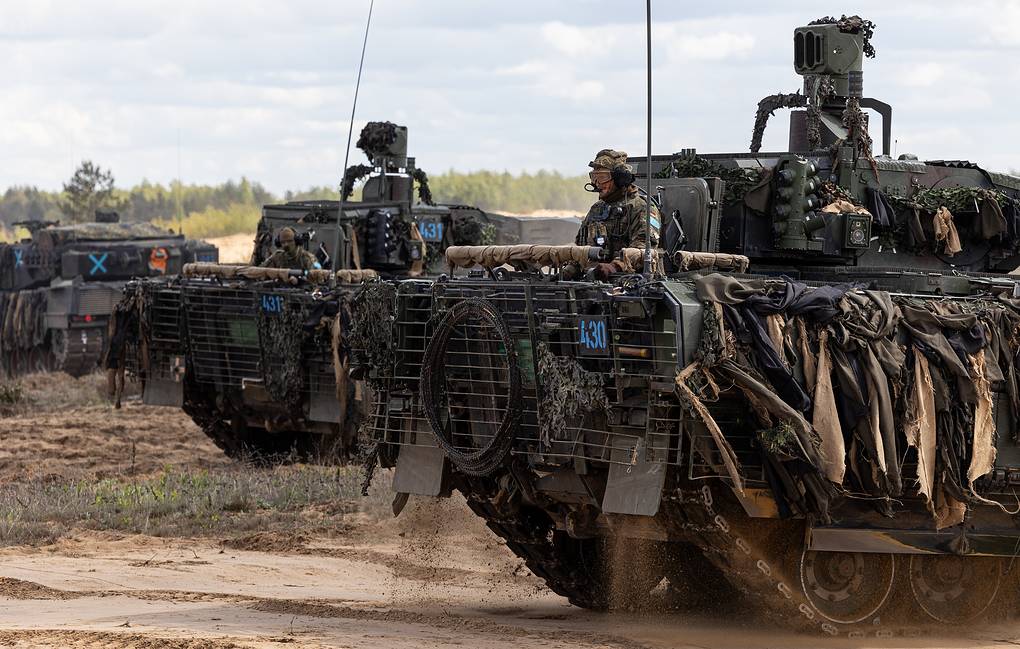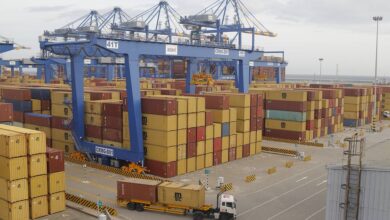Press review: NATO drills risk Russian response as lasting peace in Gaza remains uncertain
Top stories from the Russian press on Monday, October 13th
MOSCOW, October 13. /TASS/. NATO’s nuclear drills may prompt Russia to respond; lasting peace in the Gaza Strip remains uncertain; and Afghan-Pakistan border clashes are unlikely to turn into a war. These stories topped Monday’s newspaper headlines across Russia.
Izvestia: NATO’s nuclear drills may prompt Russia to retaliate
October 13 marks the start of NATO’s nuclear deterrence exercise, dubbed Steadfast Noon. This year, Finland is for the second straight year participating in the drills. This is a risky development because such an exercise may prompt Moscow to take retaliatory steps, a senior member of Russia’s Federation Council (upper house of parliament) told Izvestia.
Russia creating, successfully testing new weapons, says Putin
These kinds of drills make it obvious that NATO is not a defensive alliance but an offensive one, Federation Council Deputy Chairman Konstantin Kosachev stressed. According to him, it’s NATO that has been taking provocative steps since the end of the Cold War, while Moscow has repeatedly called on the alliance to stop the eastward expansion of its military infrastructure and end the integration of states bordering Russia.
Russia may respond by conducting its own maneuvers, Alexey Leonkov, military expert and editor of the Arsenal of the Fatherland magazine, pointed out. "We hold annual strategic drills anyway, which notably involve our strategic nuclear forces — the nuclear triad," he explained. The combat capability of Russia’s nuclear triad has been upgraded by 99%, Leonkov noted, adding that no NATO country has managed to reach such a level yet.
This time, Finland is taking part in the exercise for the second consecutive year. The country will contribute to the drills by deploying staff officers and several aircraft. Helsinki explained its participation in the drills by citing the need to engage in NATO’s nuclear planning after joining the bloc. However, it creates additional threats to Russia, Andrey Klintsevich, head of the Center for the Study of Military and Political Conflicts, warned. "Finnish infrastructure facilities will be used in the drills. Finnish pilots will gain experience in using bombs to perform their missions. No nuclear weapons have been deployed to Finland yet, but the Americans could store them there after the exercise is over. It’s very close to our country’s north," the expert said.
The NATO drills are, first and foremost, a signal to Russia’s military and political leadership, Klintsevich emphasized. In a situation of geopolitical tensions, such drills serve as a very strong message, the analyst concluded.
Izvestia: Lasting peace in Gaza remains uncertain
An international summit on ending the war in the Gaza Strip is being held in Egypt on October 13. The focus is on the implementation of US President Donald Trump’s proposed peace plan. Still, a long-term settlement remains uncertain as the Palestinian movement Hamas has no intention of disarming, Izvestia notes.
Hamas presents list of living Israeli hostages expected to be released under Gaza deal
Trump’s plan provides for an immediate ceasefire on the condition that Israeli hostages are released within 72 hours, and rules out the involvement of Hamas and other armed groups in Gaza’s governance. According to the document, control of the enclave is supposed to be handed over to an internationally supervised temporary technocratic government. Although the first phase of the deal looks feasible, a long-term settlement will require resolving complex issues, including Hamas’ disarmament, the full withdrawal of Israeli troops and the establishment of an administrative framework in Gaza.
Hani Salah, an expert on Palestinian resistance, believes that it’s crucial to distinguish between the US plan and Hamas’ stance. In his opinion, even though the movement agreed to release Israeli hostages and relinquish authority in Gaza, the disarmament issue remains a core one for Hamas. Handing weapons over to Israel or approving the deployment of international forces to Gaza remains intolerable for the Palestinian side, the expert stressed.
Media outlets are already reporting that Hamas’ security forces have started to reassert control over Gaza. According to Arab media, the movement’s cells have expanded their presence in the central and southern areas of the enclave, where Israeli troops used to be stationed.
Roman Yanushevsky, editor-in-chief of Israel’s Channel 9 website, points out that the Israeli Defense Forces’ Operation Gideon's Chariots II to seize Gaza was unlikely to fully defeat Hamas, but it was steadily weakening the movement. The expert noted that after exchanges are completed and Israeli hostages return home, it will be challenging for the Jewish state to resume military operations in Gaza. Yanushevsky added that the world sees the return of hostages as a key argument in favor of ending the war, and any decision Israel makes to resume the military operation may provoke broad international opposition.
Media: Afghan-Pakistan border clashes unlikely to turn into war
Tensions have risen on the border between Afghanistan and Pakistan, with the two countries exchanging shelling and attacks on border posts. The situation intensified after Pakistan tried to eliminate the leader of an anti-government armed group sheltering in Afghanistan. The current spike in violence marks another round of a long-running confrontation between Kabul and Islamabad over territorial disputes, but is unlikely to escalate into a large-scale war, said experts interviewed by Izvestia.
Afghanistan’s Defense Ministry announces completion of operation in Pakistan — TV
Afghanistan-Pakistan relations have always been highly complicated, said Alexey Kupriyanov, head of the Center of the Indo-Pacific Region at the Russian Academy of Sciences’ Institute of World Economy and International Relations. The key factor is the so-called Durand Line drawn back in colonial times, which Afghanistan still has not recognized as an official border.
"The new Taliban government claims to represent the entire nation and also calls for revising the border. Pakistan, in turn, accuses the Afghan government of supporting militants from the Tehrik-i-Taliban Pakistan movement," the expert remarked.
What causes further concern to Islamabad is a closer relationship between Afghanistan and India, which could in the future make the country face the threat of a two-front conflict, the analyst added. The clashes on the Afghanistan-Pakistan border took place amid the Afghan foreign minister’s first visit to India since 2021. Still, this is likely a coincidence, Kupriyanov told Vedomosti. Indian political scientist Nandan Unnikrishnan, however, did not rule out that the Pakistani military's aggression could reflect Islamabad’s displeasure with a joint statement by the top diplomats of India and Afghanistan.
Military activities on the border flare up regularly in recent years, but the parties usually agree to end them, South East Asia expert Vladimir Sotnikov told Izvestia. In his view, there is no reason to regard the current tensions as a prelude to a major-scale war between Pakistan and Afghanistan.
Media: Trump revives idea of trade war with China
US President Donald Trump has jolted the markets with his abrupt return to the policy of a tariff war against China, which he threatened to restart on November 1 in response to Beijing’s restrictions on rare-earth metals. Still, this could simply be part of tough negotiations ahead of a meeting between the two countries’ leaders, Vedomosti notes.
China and the United States have entered a period of intense bargaining and an escalation of mutual grievances, said Vasily Kashin, director of the Center for Comprehensive European and International Studies at the Higher School of Economics.
Trump says never cancelled meeting with Xi, but unsure if it will take place
They are probably engaged in active talks, seeking to find common ground, the expert went on to say. Although both sides agree that they have in fact turned into enemies and their relations are bound to deteriorate further, they don’t want to see their economies drift apart in a disorderly manner because they critically depend on each other in a number of production chains. Kashin believes there still is a chance that Trump and Chinese President Xi Jinping will meet at an Asia-Pacific Economic Cooperation (APEC) summit in South Korea.
We can now see Trump acting in his characteristic way, taking the toughest stance in talks, Vladimir Vasilyev, senior research fellow at the Russian Academy of Sciences’ Institute for US and Canadian Studies, pointed out. However, the new tariffs, if introduced, won’t be as severe. Chances are that Washington has come to the conclusion that a military conflict is ineffective as a strategic element, while it would be better to strain the Chinese economy, Vasilyev believes.
Trump’s statements about 100% tariffs on Chinese imports triggered a record decline on the cryptocurrency market. However, experts interviewed by Kommersant expect the market to recover soon, pointing to investor activity amid expectations of a key rate cut by the US Federal Reserve, as well as to the underlying appeal of the crypto market.
Cryptocurrencies remain an attractive asset in a period of inflation, market participants note. "The market may see the prices of key currencies reach new highs in the coming weeks," said Mikhail Smirnov, communications director at the EXMO crypto exchange. Many experts also expect that the US and China will once again be able to resolve their economic tensions, as has already happened since Trump’s coming to power.
Rossiyskaya Gazeta: China cuts LNG imports to expand Russian pipeline supplies
China’s imports of liquefied natural gas (LNG) fell by 22% in September 2025 compared to the same month last year. The country has been reducing LNG purchases for the eleventh consecutive month, Rossiyskaya Gazeta reports, citing Bloomberg and Kpler. Earlier, China’s gas demand was expected to be the main driver behind a rise in LNG deliveries.
Almaz Ishanov, head of world markets at the Oil and Gas Consulting Department of the TEK Analytical Center, identified a number of factors behind China’s declining LNG imports, which mainly include a rise in gas supplies from other sources, such as domestic production and pipeline deliveries. Pipeline gas supplies are currently at record levels thanks to Russian exports via the Power of Siberia pipeline: deliveries rose by about one-third in the first eight months of the year.
Ivan Timonin, project manager at the Implementa consulting company, observed that a certain economic slowdown in China, together with the growth of renewable energy sources, had reduced additional gas demand. Moreover, given high LNG spot prices, Chinese companies favor cheaper long-term pipeline contracts.
In Timonin’s view, the political factor, including tensions in ties with the United States, is what is making Beijing wary of US liquefied natural gas. Meanwhile, China continues to buy Russian LNG. On the other hand, according to National Energy Security Fund Deputy Director Alexey Grivach, if the US and China strike a trade deal, it will pave the way for China’s stable economic growth and a return to double-digit gas demand growth rates.

